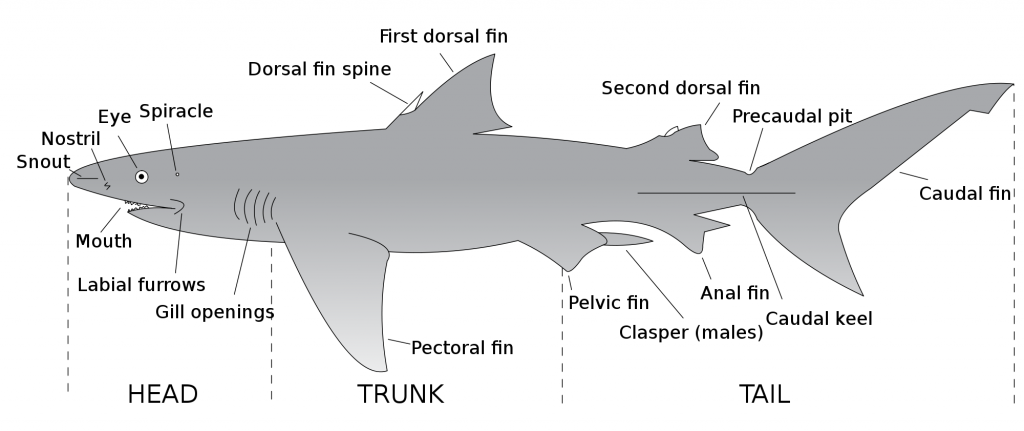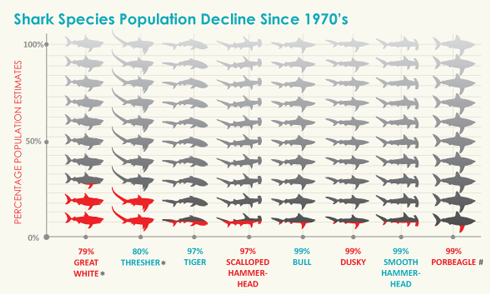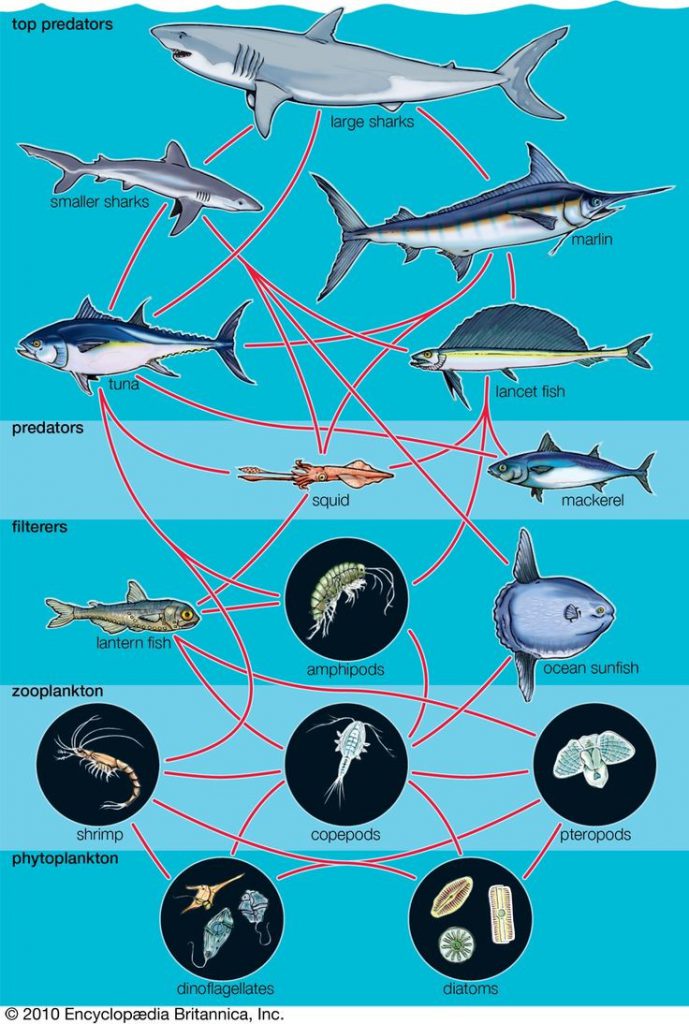In 2015 there were 98 recorded shark attacks world-wide, 6 of those attacks being fatal. It is conservatively estimated that humans kill over 100 million sharks per year, mainly by shark finning. If this article were to end right now, that statistic alone should tell you whether humans or sharks are more dangerous.
Sharks Have A Public Relations Problem
Obviously that is a big picture statistic, and it probably won’t comfort you much if you’re treading water in the middle of the ocean at night time and you feel something big brush up against your legs. And it definitely won’t help if you see a few pointed grey fins rise out of the water and start circling around you. Actually it might be the last thing on your mind if you put your head below the water and see a grey dead-eyed 20-foot behemoth of the depths charging towards you, it’s cavernous mouth displaying multiple rows of jagged razor sharp teeth ready to separate your legs from your torso in the most violent way possible…but chances are, that’s not going to happen, and I am being at least a little dramatic.
These scenarios are chilling, no question about it. But I live in a landlocked province in Canada, and the city I live in doesn’t even have an aquarium, so why would I have any fear of sharks? Really, my first thoughts formed around sharks probably came from watching Spielberg’s Jaws. After that, I was likely influenced by Shark week on Discovery channel, and seeing Great White sharks leap out of the water to rip seals in half. Sharks have a bit of a public relations problem, fueled by popular media and an unending stream of gruesome shark attack scenes in Hollywood films. For entertainment purposes, the premise works. The thought of going for a refreshing dip in the ocean on a hot day only to be violently interrupted by a toothy tube shaped fish monster is scary. But it isn’t logical, it isn’t reality, and we know more about sharks today than we ever have before. With a little research and some critical thinking, we can educate ourselves on the true nature of sharks and what threat, if any, they pose to humans.
About Sharks
According to Wikipedia, there are over 500 known species of sharks. The majority of these aren’t considered dangerous to humans. Usually when sharks do attack humans it’s because they made a mistake. Sharks are actually older than the dinosaurs. They’ve been inhabiting the Earth’s oceans for a lot longer than we have. They had to eat something for those millions of years before us homo sapiens popped up and learned how to swim. As you can imagine, humans aren’t a sharks natural prey, and more often than not, they realize this after they take a nice little bite out of an unsuspecting swimmer. Sometimes smaller sharks mistake moving arms and legs as prey, and after they realize that it’s not, they move on. When recorded shark attacks increase, it’s usually correlated with an increase in humans swimming in the oceans, after all, it is their habitat. This isn’t to say that sharks can’t be dangerous. While most sharks are harmless, they still deserve to be treated with caution and respect. The main three species of sharks that can be dangerous to humans are Bull Sharks, Tiger Sharks, and Great White Sharks, and this is mainly due to their size, and ability to inflict damage if they do mistakenly bite a human.
So where do sharks normally live? Well yes, the majority live in our oceans (their oceans?). But sharks have adapted to a wide range of habitats in the oceans, from warmer shallow coaster regions, do colder deep ocean regions and beyond. Some have made their habitat the ocean floor. Interestingly, there are some freshwater sharks that can be found in lakes and rivers, depending on the region (usually places like Australia and Asia). One species of shark has a unique ability to live in both fresh and salt water. That species is the bull shark. They are not true freshwater sharks, but they can live in fresh water and they’ve even been found in the Mississippi river. The Glyphis is the real fresh water shark genus, which is comprised of just three known species. Ultimately, the vast majority of sharks are found in the oceans.
Are Sharks Less Dangerous Than Vending Machines?
As mentioned earlier, 6 fatal shark attacks were reported in 2015. I won’t be the first to bring this up, but there have been years where vending machines have caused more fatalities than shark attacks. That’s just from vending machines falling on unsuspecting snack enthusiasts, and it doesn’t even account for deaths caused by the side effects of eating too many snacks that come from vending machines. Maybe that isn’t relatable since vending machines aren’t found in the ocean. If you’re out swimming and you really want to be afraid of something killing you, look out for box jellyfish, after all, they kill around 200 people annually, and they don’t even have teeth. There are a lot of things that kill more people than sharks, including Christmas tree lights, ants, lightening, and automobile accidents. Actually, it looks like the biggest killer of humans is cardiovascular disease, so maybe we should be less worried about shark attacks, and more worried about heart attacks. Lay off the Doritos, man.
How To Prevent Shark Attacks
There are some precautions that you can take to minimize the chance of being bitten by a shark. The number one tip, which I can almost 100% guarantee will keep you safe from a shark attack (barring a real life Sharknado) is this…never enter a body of water again. Even if you just limit your contact with bodies of water to swimming pools and bath tubs, you should be safe. But what if you’re a normal person, and you want to swim in an ocean?
- Swim in groups. Sharks are more likely to attack an individual.
- Avoid swimming in the dark or during twilight hours. This is when sharks are looking for food.
- Don’t go in the water if you’re bleeding. Blood can attract sharks.
- Don’t wear shiny jewelry in the water, it can look like fish scales to a shark.
- Don’t go in water being used by fisherman. Their bate could attract sharks.
- Try not to wear bright colors in murky water. Sharks can detect contrast well.
- Watch out for sandbars and steep drop-offs. Sharks often occupy these areas.
- Don’t go in the water if sharks have been sighted in the area.
- Don’t approach sharks if you see them.
- Between the months of 5-9, only swim from 9-5.
Humans VS. Sharks
As of late, there has been a movement to demystify and educate people on sharks. Documentaries such as Sharkwater have shed light on sharks, their behaviors and their eco-systems, and perhaps more importantly, the effects that we humans are having on sharks.
As mentioned earlier, conservative estimates say that humans kill over 100 million sharks annually. Higher estimates put that number at over 270 million sharks killed annually. How could we possibly be killing that many sharks? Well sometimes they get caught up in fishing nets and die, but the majority of sharks killed for soup. What soup you ask, could be so desirable that it warrants the use of between 100 and 270 million sharks per year? Shark fin soup. Although sales of shark fin soup are dropping significantly, China still loves shark fin soup. A coveted delicacy, it’s deeply engrained culturally, and its existence dates back to the Ming Dynasty.
There is a startling reality that accompanies shark fishing primarily for the purpose of shark fin soup. Fisherman can get a lot more money for a shark fin, than for the rest of the shark. Shark fins can go for around $650/kg on average, but some fins can sell for $20,000-$50,000 USD. But sharks are big and heavy and it’s hard to get a lot of sharks back to the mainland on a small boat. The solution? Cut the fins off the shark and toss it back into the ocean to die a slow and painful death. It’s called finning, and that is how most sharks are killed today. When a shark has its fin cut off and it’s thrown back into the water and it can’t swim. So it sinks, suffocates, bleeds out, or is eaten by other scavengers.
I know what you’re thinking. Shark fin soup must be the best tasting soup of all time. Well I’ve got bad news for you…Shark fin soup might taste okay, but the flavor doesn’t even come from the shark fin, and shark fins are almost tasteless. The role of a shark fin in shark fin soup is to provide texture. Apparently, it can be described as “between chewy and crunchy”.
Well then, shark fins must have some other appeal. It used to be a rare and coveted dish. It’s still desired, but it’s not as rare as it used to be. In Chinese culture, shark fins are believed to have many health boosting properties including improved sexual potency, preventing heart disease, lowering cholesterol, and providing energy, among others. These perceived health claims are not at all supported by any scientific evidence. In fact, there are more vitamins in your average bowl of vitamin soup. So it seems that shark fin soup doesn’t improve health, and it doesn’t really taste that great. The next big step is in education. The problem lies heavily in cultural beliefs and misinformation regarding the properties of shark fins. There have been some big steps made in education the public in this regard, but shark fin soup is still widely consumed in China. There is a great infographic about shark finning available here from sharktruth.com
Repercussions of Shark Finning
What are the repercussions? Well sharks are slow to reproduce, and such dramatic declines in their populations make them susceptible to extinction. Sharks are a big part of our oceans eco-systems and their decline in population has a big effect on the rest of inhabitants of those eco-systems. Sharks are the apex predator in their habitats. Sharks usually hunt the weak and old fish in their waters, and by default the remaining healthy fish are able to mate and sustain stronger and healthier populations.
Sharks are the cornerstones of their eco-systems. They not only keep prey populations healthy, they also keep other vital habitats healthy just through their presence alone. When sharks are near, other animals can’t overpopulate and destroy grass beds by overfeeding. This was observed by scientists in Hawaii when they studied sea turtles eating grass beds. When sharks were not present, the turtles would eat the best sea grass and destroy those grass beds over time, causing a detrimental effect on that environment. When sharks were present, the turtles were forced to graze less, and move on from those locations. The loss of our planets sharks could have a massive negative impact on the eco-systems of our oceans. Sharks are older than the dinosaurs, but with over-fishing for the purpose of finning, we could lose our shark populations entirely, and as a byproduct, destroy the eco-systems to which they are so important.
Another recently discussed possibility of removing these predators from the food chain is an increase in the C02 of these ocean ecosystems. This increase in C02 production could increase the rate of climate change.
Taking preventative measures to protect the sharks means that we are also taking measures to protect our oceans, and in effect, the natural balance of our planets eco-systems. As you can see, humans are much more dangerous to sharks than sharks could ever be to humans. Through education the public, we can send the message that sharks don’t pose a threat to humans. It is also important to dispel the false belief that shark fin soup has health boosting properties, and we can also educate the public in regards to the important role that sharks play in our eco-systems. The scientific community is doing a great job of raising awareness about these issues, but ultimately it must be the public that takes a stand against the over-fishing of sharks.
If you would like to learn more about shark finning, and what can be done to stop it here are some resources that you can use:
https://en.wikipedia.org/wiki/International_Union_for_Conservation_of_Nature
http://shark-facts.com/shark-finning/
https://en.wikipedia.org/wiki/Sea_Shepherd_Conservation_Society






